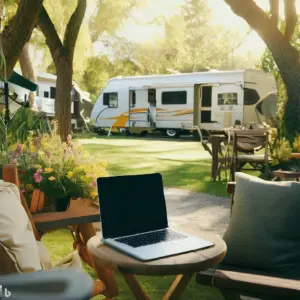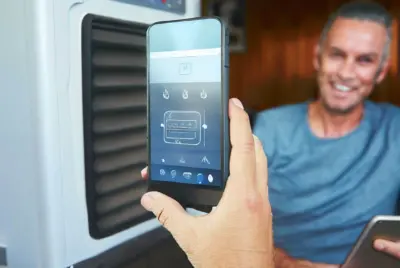Unleash the Power of Connectivity: The Ultimate Guide to Internet RV Camping
The Ultimate Guide to Internet for RV Life: Finding the Best RV Internet Options
Embarking on an RV adventure allows you to experience the freedom of the open road while still staying connected to the online world. Having reliable internet access in your RV is essential for staying connected with loved ones, working remotely, streaming your favorite shows, and accessing valuable information on the go. This comprehensive guide will explore the best RV internet options, from dedicated hotspots to campground Wi-Fi and cellular data solutions. Whether you’re a full-time RVer or enjoying a weekend getaway, we’ll help you find the best internet solution to meet your unique needs and enhance your RV lifestyle.
Best Mobile Internet for RV Travelers
As an avid RV camper and digital nomad myself, I understand the importance of staying connected while on the road. Having reliable mobile internet is crucial for work, entertainment, and staying in touch with loved ones. In this section, I’ll share some of the best mobile internet options for RV travelers, helping you stay connected wherever your adventures take you.
Cellular Internet: Your On-the-Go Lifeline
Regarding the internet for your RV, cellular internet is the go-to option for many travelers. It utilizes the same network your smartphone relies on, offering excellent coverage nationwide. With a cellular internet plan, you can enjoy fast and reliable internet access from the comfort of your RV.
Mobile Hotspots: Your Personal Wi-Fi Hub
One popular option within cellular internet is using a mobile hotspot. This nifty device acts as your personal Wi-Fi hub, allowing you to connect multiple devices simultaneously. Simply insert a SIM card with a data plan into the hotspot, and you’ll have internet access wherever there’s cellular coverage. Mobile hotspots are portable, easy to set up and provide a reliable connection for all your devices.
Satellite Internet: Wide Coverage, Remote Access
In remote areas where cellular signals may be weak or nonexistent, satellite internet can be a game-changer. Satellite internet relies on a satellite dish installed on your RV to establish a connection with satellites orbiting the Earth. While it may have higher latency and lower speeds than cellular internet, it offers coverage in areas other options may not reach.
RV Parks and Campgrounds: Utilizing Available Wi-Fi
Many RV parks and campgrounds provide internet service as part of their amenities. While the quality and reliability of Wi-Fi at these locations can vary, it’s worth utilizing them whenever possible. Check with the campground management for any Wi-Fi passwords or restrictions. This can be a convenient option for lighter internet usage or as a backup when other options are limited.
Data Plans and Coverage: Choose Wisely
Consider your usage habits and travel destinations when selecting a mobile internet plan. Look for providers with good coverage in the areas you plan to visit. Unlimited data plans are ideal for heavy internet users, while those with lighter needs may find capped plans more suitable. Research different providers, compare plans, and read customer reviews to make an informed decision.
Having reliable mobile internet is crucial for RV travelers who want to stay connected while exploring the great outdoors. By utilizing cellular internet, mobile hotspots, satellite internet, and campground Wi-Fi, you can ensure a seamless internet experience during your RV adventures. Remember to choose a plan and provider that best fits your needs and travel destinations.
Boosting Wi-Fi Signal in My RV: Tips and Tricks
As a passionate RV camper who loves to stay connected, I know how frustrating it can be when the Wi-Fi signal in your RV is weak or unreliable. Thankfully, there are several ways to boost the Wi-Fi signal and ensure a smooth online experience while enjoying your camping adventures.
Positioning and Orientation: Find the Sweet Spot
One effective way to boost your RV’s Wi-Fi signal is strategically positioning your devices and the router. Experiment with different locations inside your RV to find the best spot that provides optimal signal strength. Avoid placing the router near metal objects or thick walls that can obstruct the signal. Additionally, try orienting the router’s antennas for maximum coverage and signal distribution.
Wi-Fi Range Extenders: Expanding Your Reach
If you’re struggling with a weak Wi-Fi signal in your RV, investing in a Wi-Fi range extender can significantly improve your connectivity. These devices amplify the existing Wi-Fi signal, extending its range and covering dead spots within your RV. Simply plug the range extender into an electrical outlet, connect it to your existing Wi-Fi network, and enjoy a stronger and more reliable signal throughout your RV.
Wi-Fi Booster: Amplifying Signal Strength
A Wi-Fi booster is another great option to enhance the Wi-Fi signal in your RV. Like a range extender, a Wi-Fi booster amplifies the incoming signal from a public Wi-Fi hotspot or campground network. It then rebroadcasts the boosted signal, allowing you to connect to it with improved speed and stability. This is particularly useful when you’re relying on public Wi-Fi networks while camping.
Cellular Data Hotspots: Reliable Internet Anywhere
 When the campground Wi-Fi or public Wi-Fi networks are not up to par, utilizing a cellular data hotspot can be a game-changer. These devices use cellular networks to provide internet access to your RV. Choose a reputable cellular data provider and opt for a hotspot device with good coverage and high-speed data. With a cellular data hotspot, you can enjoy reliable internet regardless of your location.
When the campground Wi-Fi or public Wi-Fi networks are not up to par, utilizing a cellular data hotspot can be a game-changer. These devices use cellular networks to provide internet access to your RV. Choose a reputable cellular data provider and opt for a hotspot device with good coverage and high-speed data. With a cellular data hotspot, you can enjoy reliable internet regardless of your location.
Having a strong and reliable Wi-Fi signal in your RV is essential for staying connected and enjoying a seamless online experience while camping. You can significantly enhance your RV’s Wi-Fi signal by strategically positioning your devices, using Wi-Fi range extenders or boosters, and considering cellular data hotspots. Stay connected, stream your favorite shows, work remotely, and share your adventures with friends and family effortlessly. Boosting your RV’s Wi-Fi signal ensures that you have a smooth and enjoyable online experience wherever your RV takes you.
The Difference Between Satellite Internet and Cellular Data for RVs
When it comes to staying connected in your RV, you may come across two primary options: satellite internet and cellular data. Here are some helpful suggestions for choosing the right one for your RV adventures:
Satellite Internet: Connecting in Remote Areas
Satellite internet for RVs is a great choice when you’re traveling to remote areas with limited or no cellular coverage. It relies on a satellite dish installed on your RV to establish a connection with satellites orbiting the Earth. This means you can access the internet even in places where cell phone signals are weak or nonexistent.
Satellite internet offers widespread coverage, making it ideal for RVers who love off-the-grid adventures. However, it’s important to note that satellite internet may have higher latency (delay) than cellular data, resulting in slower response times. Additionally, it can be more expensive than cellular data due to the equipment and monthly subscription costs associated with satellite internet services.
Cellular Data: Reliable and Convenient
Cellular data, on the other hand, utilizes the same network that your cell phone relies on. It provides internet access to your RV through a cellular data plan offered by a mobile network provider. Cellular data is known for its reliability and convenience, as it offers fast and stable internet connections in areas with good cellular coverage.
With cellular data, you can enjoy seamless internet access while on the go. It allows you to stream videos, browse the web, and stay connected with family and friends without relying on Wi-Fi networks. The availability of various data plans from different providers offers flexibility in choosing the one that best suits your needs and budget.
Both satellite internet and cellular data have their own advantages for RV internet services. Satellite internet provides coverage in remote areas, ensuring you stay connected even in the most secluded campsites. On the other hand, cellular data offers reliability and convenience, keeping you connected wherever there is a good cell phone signal.
Consider your RV travel destinations and connectivity requirements when choosing between satellite internet and cellular data. If you often venture into remote areas with limited cellular coverage, satellite internet might be your best option. However, cellular data is likely the better choice if you primarily travel in areas with reliable cell phone signals and desire convenience.
Evaluate your needs, research different providers, and compare plans to make an informed decision. By selecting the right internet option for your RV, you can enjoy a seamless online experience and stay connected during your adventures.
Are There Specific Routers or Modems Recommended for RV Internet Usage?
When it comes to routers and modems for RV internet usage, specific devices are recommended for optimal performance. In this article, I’ll share some helpful suggestions and reasons for choosing the right routers or modems for your RV adventures.
RV-Specific Routers: Designed for Life on the Road
RV-specific routers are tailored to meet the unique needs of RV travelers. These routers are designed to withstand the challenges of a mobile lifestyle, including vibrations, temperature fluctuations, and power fluctuations commonly experienced while on the road. They often come with features such as built-in antennas for better signal reception and external ports to connect external antennas for improved range and coverage.
High-Speed Modems: Unlocking Faster Internet Speeds
Consider using a high-speed modem to enjoy faster speeds and a more seamless online experience. These modems are built to handle higher data transfer rates and support advanced network technologies. They are compatible with various internet service providers and offer faster connection speeds for streaming, gaming, and other bandwidth-intensive activities. A high-speed modem can deliver blazing-fast internet speeds to your RV when paired with a suitable data plan.
Hotspot Devices: Portable Connectivity Solutions
 Hotspot devices are another option to consider for RV internet usage. These portable devices act as Wi-Fi routers, allowing you to connect multiple devices to the internet simultaneously. Hotspots utilize cellular data networks to provide internet access to your RV, giving you the freedom to stay connected wherever there is cellular coverage. Look for hotspot devices that support high-speed data and offer good coverage from reliable mobile network providers.
Hotspot devices are another option to consider for RV internet usage. These portable devices act as Wi-Fi routers, allowing you to connect multiple devices to the internet simultaneously. Hotspots utilize cellular data networks to provide internet access to your RV, giving you the freedom to stay connected wherever there is cellular coverage. Look for hotspot devices that support high-speed data and offer good coverage from reliable mobile network providers.
Choosing the right router or modem for your RV internet usage is crucial for a reliable and fast internet connection. RV-specific routers are designed to withstand life’s challenges on the road, ensuring durability and enhanced performance. High-speed modems unlock faster internet speeds, allowing you to enjoy bandwidth-intensive activities without buffering or lag. Hotspot devices offer portable connectivity solutions, making staying connected easily using cellular data networks.
Consider your specific needs, the coverage areas you’ll be traveling in, and the type of internet service you prefer when selecting a router or modem for your RV. Research different models, read customer reviews, and consult with knowledgeable experts to make informed decisions. With the right equipment, you can enjoy high-speed internet and stay connected throughout your RV adventures.
Can I Stream Netflix and Other Video Services Reliably with RV Internet?
When it comes to streaming videos in your RV, several factors must be considered to ensure a smooth streaming experience.
Reliable Mobile Internet: A Must-Have for Streaming on the Go
Having a reliable mobile internet connection is essential to stream Netflix and other video services in your RV. Opt for a mobile internet plan that offers good coverage in the areas where you’ll be traveling. Choose a reputable cellular data provider with high-speed data and sufficient data allowances to support your streaming habits.
Consider Data Usage: Stay Within Your Plan’s Limits
When streaming videos in your RV, it’s important to consider your data usage. Streaming video consumes significant data, so be mindful of your plan’s data allowances. If you have a limited data plan, it’s advisable to stream in standard definition (SD) rather than high definition (HD) to conserve data. Additionally, you can download movies or shows in advance when you can access Wi-Fi and watch them offline to minimize data usage while on the go.
Wi-Fi Boosters or Extenders: Enhancing Wi-Fi Connectivity
If you rely on the campground or public Wi-Fi for streaming in your RV, consider using Wi-Fi boosters or extenders. These devices can improve the Wi-Fi signal and range, allowing you to connect to the internet more reliably. With a stronger Wi-Fi signal, you’ll have a better streaming experience and reduce the chances of buffering or interruptions.
Streaming Netflix and other video services reliably with RV internet is indeed possible. You can enjoy uninterrupted entertainment while on the road by ensuring you have a reliable mobile internet connection, staying within your data plan’s limits, and considering Wi-Fi boosters or extenders. Choose a mobile internet plan that fits your streaming needs, and optimize your data usage by adjusting video quality settings and utilizing offline downloads. With the right setup and mindful usage, you can relax and enjoy your favorite shows and movies while experiencing the freedom of RV camping.
What Are the Data Usage Limits for RV Internet Plans?
Knowing the limits of your data plan is crucial to avoid unexpected charges and ensure a seamless online experience.
Assess Your Internet Usage Needs
Before delving into the specifics of data usage limits, assessing your internet usage needs is important. Consider how you will use the internet in your RV, such as streaming videos, browsing the web, working remotely, or staying connected with family and friends. This will help you determine the amount of data you are likely to consume on a monthly basis.
Understand Data Plan Terminology
When exploring RV internet plans, it’s crucial to understand the terminology associated with data usage limits. Providers often use terms such as “data cap,” “data allowance,” or “monthly data limit.” These terms refer to the maximum amount of data you can use within a billing cycle before your speeds are reduced or additional charges apply. Knowing your data limit is important to avoid unexpected interruptions or expenses.
Unlimited Data Plans: Consider Throttling
While some RV internet plans offer unlimited data, reading the fine print is essential. Providers may implement “throttling” once you exceed a certain amount of data. Throttling involves reducing your internet speeds temporarily to manage network congestion. Take note of the threshold at which throttling may occur and consider your data needs accordingly.
Understanding the data usage limits of RV internet plans is vital for a smooth and hassle-free online experience while on the road. Assess your internet usage needs and consider providers’ specific terminology to communicate data limits. If you require higher data usage, explore unlimited plans but be aware of potential throttling. Always read the terms and conditions of your chosen plan to ensure you clearly understand the data allowances and any additional charges that may apply.
By clearly understanding data usage limits and aligning them with your internet needs, you can make informed decisions when selecting an RV internet plan. Stay connected, stream your favorite shows, and enjoy all the benefits of a reliable internet connection to your RV camping adventures.
Are There Any Affordable Unlimited Data Plans for RV Internet?
An unlimited data plan allows you to enjoy seamless internet access without worrying about data caps or overage charges.
Research Different Providers
When searching for affordable unlimited data plans for RV internet, it’s important to research different providers. Look for mobile network providers offering competitive rates and reliable coverage in the areas you plan to travel. Take the time to compare various plans’ prices, features, and terms to find the best fit for your budget and requirements.
Consider Mobile Virtual Network Operators (MVNOs)
Mobile Virtual Network Operators (MVNOs) are alternative service providers that offer cellular plans using major carriers’ networks. They often provide more affordable options compared to the big-name carriers. Explore MVNOs specializing in RV internet plans, as they may offer cost-effective unlimited data options. Ensuring that the MVNO you choose has reliable coverage and a good reputation among RVers is important.
Throttling Policies and Network Management
When considering unlimited data plans, it’s crucial to understand the providers’ throttling policies and network management practices. Some plans may have specific thresholds at which your speeds may be reduced during times of network congestion. Familiarize yourself with these policies to determine if they align with your usage habits and requirements.
While finding unlimited data plans for RV internet at a low cost can be challenging, affordable options are available if you know where to look. Research different providers and explore mobile virtual network operators that offer specialized RV internet plans. Consider each provider’s pricing, coverage, and reputation before making a decision.
Remember also to review the throttling policies and network management practices of the plans you’re considering to ensure they align with your internet usage needs. By thoroughly researching and comparing options, you can find an affordable unlimited data plan that suits your RV internet requirements and helps you stay connected on your adventures.
How Do I Set Up a Wi-Fi Hotspot in My RV for Multiple Devices?
As an avid RV camper who understands the importance of staying connected, I know how valuable it is to set up a Wi-Fi hotspot in your RV for multiple devices. Whether you’re traveling with family, friends, or simply need to connect multiple devices simultaneously, having a reliable Wi-Fi hotspot can enhance your RV experience. In this article, I’ll provide helpful suggestions and reasons to guide you in setting up a Wi-Fi hotspot in your RV for multiple devices.
Choose the Right Mobile Hotspot Device
The first step in setting up a Wi-Fi hotspot in your RV is selecting the right mobile hotspot device. Look for a device that supports multiple connections simultaneously, with good coverage and fast data speeds. Consider devices with external antenna ports for improved signal reception, especially if you travel to areas with weaker cellular coverage.
Select a Suitable Data Plan
You’ll need a suitable data plan to ensure a seamless connection for multiple devices. Choose a plan that offers sufficient data allowances to accommodate the internet usage of all connected devices. Some providers offer plans specifically designed for RVers, providing higher data allowances and affordable rates. Research different providers and compare their data plans to find one that fits your needs.
Consider Unlimited Data Plans
If you have multiple devices and anticipate heavy internet usage, an unlimited data plan may be viable. Unlimited plans allow you to enjoy internet access without worrying about data caps. However, keep in mind that some unlimited plans may have speed throttling after reaching a certain data threshold, so review the plan’s terms and conditions before making a decision.
Setting up a Wi-Fi hotspot in your RV for multiple devices is a great way to stay connected and ensure everyone can enjoy internet access while on the road. Choose a mobile hotspot device that supports multiple connections and offers good coverage. Select a suitable data plan that meets the data needs of all connected devices, considering options like unlimited plans for heavier usage.
By setting up a reliable Wi-Fi hotspot in your RV, you can enjoy seamless internet connectivity for work, entertainment, and staying connected with loved ones. Enhance your RV experience by enabling multiple devices to connect and make the most of your adventures on the road.
Finding RV-Friendly Wi-Fi Spots: The Best Apps and Websites
As an avid RV camper who values a reliable internet connection while on the road, I understand the importance of finding RV-friendly Wi-Fi spots to stay connected. Whether you need to work remotely, stream movies, or simply browse the web, having access to Wi-Fi can greatly enhance your RV camping experience. In this article, I’ll share some of the best apps and websites to help you find RV-friendly Wi-Fi spots.
Campground and RV Park Directories
One of the best resources for finding RV-friendly Wi-Fi spots is campground and RV park directories. Websites and apps like Campendium, RV Parky, and AllStays provide comprehensive information about campgrounds and RV parks nationwide. These platforms often include user reviews and ratings that highlight the availability and quality of Wi-Fi at each location. They also provide other essential details such as amenities, pricing, and contact information.
Wi-Fi Finder Apps and Websites
Consider using Wi-Fi finder apps and websites to find Wi-Fi spots beyond campgrounds and RV parks. Apps like WiFi Map, OpenSignal, and Wi-Fi Finder allow you to search for public Wi-Fi hotspots in your vicinity. These apps rely on user-generated data to provide real-time information about Wi-Fi availability, speeds, and user ratings. You can filter the search results to find RV-friendly locations such as coffee shops, libraries, or restaurants that offer Wi-Fi access.
Coverage Maps from Cellular Providers
If you rely on cellular data for your RV internet, consider checking the coverage maps provided by major cellular network providers. Websites like Verizon, AT&T, and T-Mobile offer coverage maps showing their cellular network’s availability and strength in specific areas. This can help you identify regions with reliable cellular signal, which in turn indicates the potential for a strong personal hotspot connection in your RV.
Finding RV-friendly Wi-Fi spots is crucial for staying connected and enjoying a seamless online RV camping experience. Utilize campground and RV park directories to discover locations that provide Wi-Fi access. Explore Wi-Fi finder apps and websites to find public hotspots near your RV. Additionally, consult the coverage maps cellular network providers provide to identify areas with strong cellular signals.
By leveraging these resources, you can locate reliable Wi-Fi spots that cater to your RV internet needs. Stay connected, work remotely, stream your favorite shows, and make the most of your RV adventures with a stable and convenient Wi-Fi connection.
Ensuring Secure and Private Internet Access While Traveling in Your RV
Protecting your sensitive information is crucial whether you’re browsing the web, accessing personal accounts, or conducting online transactions.
Secure Your Network with a Strong Password
The first step to ensure secure internet access in your RV is to secure your network with a strong password. Change the default password of your router or mobile hotspot device to a unique and complex one. Avoid using common passwords or personal information that can be easily guessed. A strong password adds an additional layer of security and helps deter unauthorized access to your network.
Utilize Virtual Private Network (VPN) Services
A Virtual Private Network (VPN) is an effective tool for enhancing both security and privacy while accessing the internet. A VPN encrypts your internet traffic and routes it through a secure server, making it difficult for others to intercept and view your online activities. By using a VPN, you can browse the web, access public Wi-Fi hotspots, and conduct online transactions with peace of mind, knowing that your data is encrypted and your identity is protected.
Choose Reputable VPN Providers
When selecting a VPN provider, choosing a reputable one that prioritizes user privacy and has a strong track record of maintaining a secure network is important. Look for VPN services that offer features like no-logs policies, strong encryption protocols, and a wide range of server locations. Read reviews, compare features, and choose a VPN provider that aligns with your specific needs.
Securing and maintaining privacy while accessing the internet in your RV is vital to protect your sensitive information and enjoy a worry-free online experience. Secure your network with a strong password to prevent unauthorized access. Utilize a reputable VPN service to encrypt your internet traffic and maintain privacy, especially when connecting to public Wi-Fi networks.
By implementing these suggestions, you can ensure secure and private internet access in your RV, allowing you to browse the web, access your accounts, and confidently conduct online activities. Protect your personal information and enjoy a safe online journey during RV camping.
Finding the Best RV Internet Options
Finding the best internet solution for your RV is crucial for staying connected and enjoying a seamless online experience during your travels. Assess your internet needs and consider options such as dedicated hotspots, campground Wi-Fi, and cellular data solutions. Each option has its advantages and considerations, so weigh factors like coverage, speeds, data limits, and pricing to find the ideal solution for your RV lifestyle.
Remember, dedicated hotspots provide reliable connectivity and faster speeds but may come with data limits and monthly fees. Campground Wi-Fi can be convenient but may vary in quality and speed. Cellular data solutions offer widespread coverage, but choosing the right provider and plan is important based on your travel destinations and data requirements.
Enhance your RV life by staying connected with the best RV internet option that suits your needs. Whether you’re exploring national parks, remote locations, or RV parks, a reliable internet connection will keep you connected to the digital world while enjoying the beauty of the great outdoors.
FAQs
Can I use satellite internet for my RV?
Yes, satellite internet is an option for RVers who need internet access in remote areas. It requires a satellite dish and modem installed on your RV to establish a connection with satellite providers.
How can I conserve data usage while using RV internet?
To conserve data usage, you can optimize your devices by disabling automatic updates, using data-saving modes on streaming services, and minimizing unnecessary video streaming or large file downloads.
Are there any free Wi-Fi options available for RVers?
Yes, some places like coffee shops, libraries, and certain RV parks may offer free Wi-Fi for guests. However, free Wi-Fi networks may have speed, reliability, and security limitations.
Can I use my existing home internet plan for my RV?
It depends on your internet service provider and plan. Some providers may offer mobile hotspots or travel add-ons that allow you to extend your home internet to your RV. However, it’s important to check the terms and conditions of your plan to ensure compatibility.
What should I consider when choosing an RV internet plan?
When selecting an RV internet plan, consider factors such as coverage in your travel destinations, data limits, speeds, pricing, and contract terms. Choosing a plan that aligns with your internet needs and budget while providing reliable connectivity on the road is important.






Comments are closed.